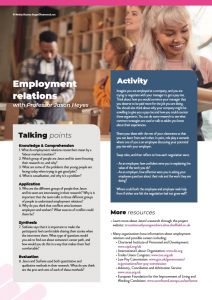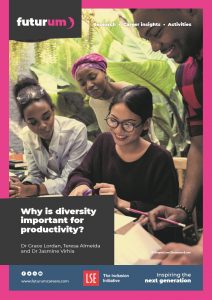How do young people manage their career pathways?
Finding a good job that is well-paid and satisfying is becoming increasingly difficult for many young people. Professor Jason Heyes, from the Sheffield University Management School, in the UK, is investigating the difficulties faced by young people moving between jobs, and which policies are most effective to improve their opportunities.
Talk like an employment relations researcher
Casualisation — when jobs are becoming less regular, with more variable hours and more unpredictable pay and working conditions
Labour market transition — a change in a person’s employment situation
Mixed methods approach — combining quantitative and qualitative methods to answer a research question from different angles
Qualitative methods — using non-numerical forms of information such as interviews, or written questions, to answer a research question
Quantitative methods — using numerical data and analysis to answer a research question
Trade union — an employee-led organisation representing workers’ rights
Underemployment — having a part-time or low-paid job because you cannot find a full-time job that fits your skills or needs
In today’s world, young people face many challenges. One of the most pressing is finding a job and making a successful career, but for many young people, there are an increasing number of obstacles in the way. Professor Jason Heyes from the Sheffield University Management School is investigating the challenges faced by young people during labour market transitions.
Employment relations researchers use the term ‘labour market transition’ to describe a change in a person’s employment situation. This could mean moving in and out of work, moving between part-time and full-time work, or moving between lower and higher quality jobs. Many researchers have studied the transitions between education and employment, and between employment and unemployment, but Jason and his team are also interested in the quality of people’s employment and how that can change over the course of their careers. Job quality includes many factors such as how enjoyable the job is, whether people have enough work or feel that they are underemployed, and whether they are in formal or informal employment. It also includes how much people are being paid and whether their pay properly reflects the skills required for the job.
Increasing challenges for young workers
“Young people are experiencing longer and more complex education-to-work transitions than in the past,” explains Jason. Once in work, young people are more likely to move between jobs, and more likely to become unemployed, compared to their older colleagues.
On top of that, the jobs that are available to young people are changing and, in many cases, are decreasing in quality. Jason’s previous research has shown that the number of young people in full-time employment has fallen and many young workers are now working part-time, or on variable hours, meaning that their incomes are more unpredictable. Delivery service providers such as Uber and Deliveroo are well-known examples of this insecure work, but casualisation is also affecting many other jobs.
More young people are now going to university, but the number of highly skilled jobs for university graduates has not increased at the same rate, meaning that people are often working in jobs that do not make use of their education. Jason wants to understand how these changes are affecting people’s ability to progress with their careers and suggest ways to improve their opportunities in the future.
Who is Jason focusing his research on?
Reference
https://doi.org/10.33424/FUTURUM513
Jason and his team are focusing their research on young people aged 18-29 in the UK. They are particularly interested in the 40-50% of people who are in work and did not go to university. “These young people have tended to be overlooked in research on transitions,” explains Jason. “We are keen to understand their stories and the problems they are facing.” The team’s research mainly focuses on people under 30, but they are also investigating how young people’s experiences affect their ability to progress to better jobs further on in their careers. They are also interested in how the labour market experiences of young workers affect their physical and mental health, including as they age.
Another topic Jason’s team is keen to address is the impact that young workers’ transitions have on their families. Previous research has looked at the role of families in supporting young workers, but the opposite effect has not been studied in as much detail. For example, if young people are more likely to become unemployed, this may place a larger burden on their families to support them.
How is Jason investigating young people’s career paths?
Jason’s team is taking a mixed methods approach to answering their research questions, which is common in many social sciences. They are analysing quantitative data from various nationally representative surveys, which ask a sample of UK households detailed questions about their employment, financial and social situations. They use these data to look for connections between factors such as age, ethnicity, gender, class or where people live, and the amount that they earn, or how happy they are in their jobs.
The team is also conducting two qualitative studies to investigate how young worker’s transitions are affected by where they live. These studies are focusing on the areas of Greater Manchester and South Yorkshire. The research consists of hour-long interviews with 30 young workers, from a diverse range of backgrounds, in each area. During the interviews, the team asks the participants to share their experiences of their job transitions, and how their personal circumstances affected whether they made a successful transition. 18 months later, the team repeats the interviews with the same people to see how their careers have progressed and whether their circumstances have changed. They also interview local employers, training providers and policymakers to get their perspectives on the challenges and opportunities of supporting young workers, and to understand how the economic policies of local and national governments are affecting these areas.
How will Jason’s research improve young people’s employment opportunities?
“The main findings have yet to emerge,” says Jason. “However, our early findings show that gender and ethnicity remain important in understanding labour market and employment outcomes, and it is clear that young workers with a long-standing illness or disability find it more difficult to progress in the labour market.” Findings like these help to highlight where there are systematic problems in the job market that need to be addressed by creating new policies in local and national government. Jason and the team are sharing their findings with local and national government organisations, and other organisations that represent and support employers and workers, such as the Chartered Institute of Personnel and Development, Chambers of Commerce and trade unions. They actively engage with these organisations so that their research goes beyond the university and helps to improve real-world practices.
 Professor Jason Heyes
Professor Jason Heyes
Sheffield University Management School, UK
Fields of research: Employment relations, political economy, public policy
Research project: The Transitions of Young Workers in the UK Labour Market: Consequences for Careers, Earnings, Health and Wellbeing
Funder: UK Economic and Social Research Council (ESRC)
This work is supported by the ESRC under award number ES/W009536/1. The contents are solely the responsibility of the authors and do not necessarily represent the official views of the ESRC.
About employment relations
Employment relations are the relationships between workers and their employers. These relationships affect how much people are paid, how many hours they work, and what their working conditions are like. Workers have an individual relationship with their managers, but collective organisation by workers (such as through a trade union) is also important to make sure their voice is heard and their power to deliver positive change is maximised.
The field of employment relations research investigates how these relationships affect the economy and society on a larger scale, and what policies governments, employers, trade unions and workers can implement to improve relations and reduce conflicts.
What does Jason find rewarding about his work?
“One of the most rewarding things about being an employment relations researcher is the opportunity to engage with employers, trade unions, workers and policy makers,” says Jason. “You can learn a lot from such engagement and, sometimes, there are opportunities to influence organisational practices or policies in ways that have the potential to improve working lives.”
What future topics are employment relations researchers likely to focus on?
In the UK, the Labour Party has said that it will introduce new employment rights. If this happens, researchers may have opportunities to inform new policies, and they will certainly study the content and outcomes of any changes the government might make to employment rights.
Pathway from school to studying employment relations
Social science subjects such as sociology, economics and politics are the typical subjects to study at school and for an undergraduate degree.
Some universities have business and management schools, which may offer more specialist undergraduate and postgraduate degrees in subjects such as human resource management.
From a more practical perspective, most forms of work experience, and even getting involved in local politics, can give you insights into employment relations. Once you have a job, you will also gain direct experience of employment relations and might also have opportunities to influence employment relations at your workplace by, for example, becoming a trade union representative. These experiences all provide useful insights which could then lead to a career in employment relations.
Explore careers in employment relations
As a researcher in employment relations, you could get a job in a university, but there are also many other jobs available in think tanks, the civil service, trade unions, or organisations such as the International Labour Organisation. There can be opportunities to move between these sectors at different stages of your career.
Instead of becoming a researcher, you could pursue a career as a human resources manager, employment lawyer, consultant or by working for an organisation such as the Advisory, Conciliation and Arbitration Service.
Meet Stefanie

Dr Stefanie Williamson is a Research Associate working on the ‘Transitions’ project alongside Jason. As a research associate, she is responsible for many of the day-to-day tasks such as interviewing young people and employers, and analysing the data that she collects. Research associate jobs like this are a common step in the career of a young researcher in many fields, not just employment relations.
Which parts of your research do you enjoy the most?
Interviewing project participants is one of the most interesting tasks. I interview such a wide variety of people, and it’s very enjoyable to get to know them individually and establish a situation where they feel comfortable sharing their experiences with me.
It’s very rewarding doing research which has the potential to positively impact young people’s lives. My research is aiming to provide information which will help to design better policies to support young people’s career paths, and that is a great source of motivation for me.
What are your proudest career achievements so far?
Completing my PhD was the biggest task that I have undertaken so far, but it was extremely rewarding to finish it after four years of study. Doing a PhD is a huge challenge, but it’s also an amazing opportunity to spend four years immersing yourself in something that you are really interested in and passionate about. Another of my proudest moments was co-authoring a book chapter and having my name published alongside well-known researchers in my field.
What are your aims for the future?
I want to continue doing research that helps people to find work and to be happy in their work.
Stefanie’s top tips
1. Keep up to date with new research in areas that you are interested in. Many research organisations have news and blogs on their websites.
2. Don’t be afraid to put yourself out there and ask for an opportunity. For example, I shadowed a teaching assistant at a university before I started my PhD. Most people are approachable!
Meet the team

Dr Bert Van Landeghem,
Co-investigator
Bert is a Lecturer in Economics at the Department of Economics at the University of Sheffield. He has published applied work in the areas of health economics, behavioural economics, and labour economics. Bert has collaborated with various stakeholders such as the Organisation for Economic Co-operation and Development (OECD), the British Department for Work and Pensions, and the Flemish Public Employment Service (VDAB).

Professor Peter W. Wright,
Co-investigator
Peter is Professor of Economics at the University of Sheffield. Peter is interested in how the labour market adjusts to shocks. He has examined the consequences for workers of redundancy and of firm merger. He was one of the co-founders of the Leverhulme Centre for Research on Globalisation and Economic Policy (GEP).

Katie Stickland,
Co-investigator
Katie Stickland works as a Knowledge Exchange Manager for the Chartered Institute for Personnel and Development (CIPD), the professional body for HR and people development.
Katie’s role helps link academic work with the real world, and vice versa, to help make workplaces better.

Dr Edward Yates,
Co-investigator
Edward is a Lecturer in Employment Relations at the Sheffield University Management School. His research examines job quality for young workers and local labour markets in the UK.

Dr Antonio Parlavecchio,
Research Associate
Antonio is a Research Associate at the Sheffield University Management School. He holds a PhD in Economics from University of Glasgow. He has previously worked at Bangor University, Stirling University and University of Manchester. Antonio’s main research interests are in labour economics, economics of the family of the family, education and health economics.

Dr Kaidong Yu,
Research Associate
Kaidong is a Research Associate with an interest in youth transitions and inequality.
Do you have a question for Jason and the team?
Write it in the comments box below and Jason and the team will get back to you. (Remember, researchers are very busy people, so you may have to wait a few days.)
Read about diversity and productivity in the workplace:
www.futurumcareers.com/why-is-diversity-important-for-productivity









0 Comments